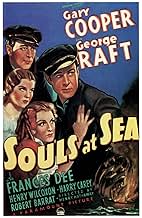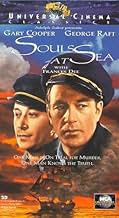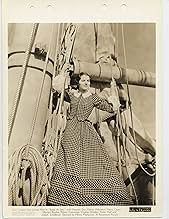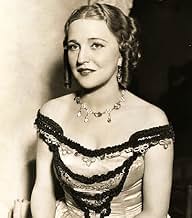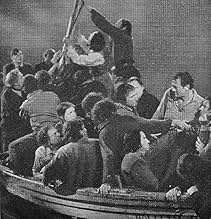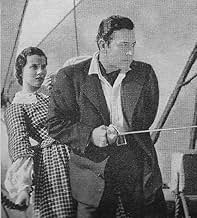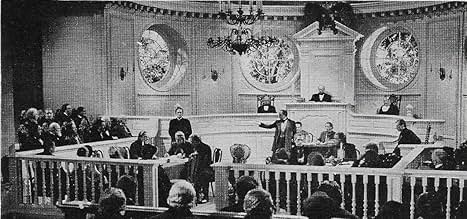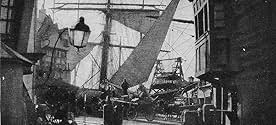अपनी भाषा में प्लॉट जोड़ेंCooper and Raft save lives during a sea tragedy in this story about slave trade on the high seas in 1842.Cooper and Raft save lives during a sea tragedy in this story about slave trade on the high seas in 1842.Cooper and Raft save lives during a sea tragedy in this story about slave trade on the high seas in 1842.
- निर्देशक
- लेखक
- स्टार
- 3 ऑस्कर के लिए नामांकित
- 3 जीत और कुल 3 नामांकन
Norman Ainsley
- Ticket Taker
- (बिना क्रेडिट के)
फ़ीचर्ड समीक्षाएं
Everything is excellent here. Gary Cooper makes one of his great character roles of double depths, George Raft makes for once a great contribution, all the characters are natural and organic, the realism is magnificent, the glory of the era of the sailing ships is enhanced and lifted out of the screen, and even the music is perfect, with many glorious moments of innovation and good humour, and the quality of the drama, both human and natural, is undeniable in its realisation with a formidable shipwreck to crown the masterpiece. Henry Hathaway knew his business thoroughly, he never committed mistakes, and this is just one of his many masterpieces.
Some of the events in "Souls at Sea" were inspired by a shipwreck in about 1840. However, despite appearances, it's clearly a highly fictionalized version of history and really doesn't claim to be a true story.
When the story begins, Nuggin (Gary Cooper) and Powdah* (George Raft) are serving aboard a slave ship. Although slavery was still legal in the States, it was illegal to import slaves...and the British navy enforced a blackade of slavers. If they caught them, the men serving aboard the slave ships were prosecuted...so you'd assume that the two men are evil. But you cannot have a film with slavers being the heroes...even back in 1937. Well, it turns out that Nuggin is actually working on his own as an anti-slaver....and he's had a history of scuttling these ships and setting the poor slaves free. As a result, he is made an undercover operative for the British...and his task involves getting to America as soon as possible to set a trap for other slave ships. But Nuggin's arch nemesis (Henry Wilcoxon) is also bound for the States to stop him...and they're aboard the same ship! What's next? Well, a lot!!
Apart from an interesting plot, the film benefits from good acting and some amazing shipwreck scenes....truly spectacular. Overall, a wonderful adventure film that isn't perfect (Raft seemed mostly wasted and in the way during most of the film), but is nevertheless well worth seeing.
* Who thought of these insane names?! Huh!??!
When the story begins, Nuggin (Gary Cooper) and Powdah* (George Raft) are serving aboard a slave ship. Although slavery was still legal in the States, it was illegal to import slaves...and the British navy enforced a blackade of slavers. If they caught them, the men serving aboard the slave ships were prosecuted...so you'd assume that the two men are evil. But you cannot have a film with slavers being the heroes...even back in 1937. Well, it turns out that Nuggin is actually working on his own as an anti-slaver....and he's had a history of scuttling these ships and setting the poor slaves free. As a result, he is made an undercover operative for the British...and his task involves getting to America as soon as possible to set a trap for other slave ships. But Nuggin's arch nemesis (Henry Wilcoxon) is also bound for the States to stop him...and they're aboard the same ship! What's next? Well, a lot!!
Apart from an interesting plot, the film benefits from good acting and some amazing shipwreck scenes....truly spectacular. Overall, a wonderful adventure film that isn't perfect (Raft seemed mostly wasted and in the way during most of the film), but is nevertheless well worth seeing.
* Who thought of these insane names?! Huh!??!
I never really found Gary Cooper to be the most invigorating of actors, but he delivers well here in this tale of maritime treachery. We start at a trial where he ("Nuggin") is being indicted for the killing of survivors from a seaborne disaster in the mid 1800s. It's while the evidence is being given that we are taken back on a retrospective of just how this honourable seaman found himself caught up, with his friend "Powdah" (George Raft) in the evil machinations of "Tarryton" (Henry Wilcoxon). When the boat he was travelling on manages to hit an iceberg, he is left to take charge. As usual there aren't enough spaces on the life boats so panic ensues, and a fairly "survival of the fittest" one at that, the results of which result in his current predicament. How to prove his innocence? Well that might lie in the hands of "Woodley" (George Zucco) who is working for the British Government on a mission to finally eradicate slavery, and who knows a thing or two about the real character of "Nuggin". It's a tautly directed adventure for the first half with plenty of duplicity going on, but when his relationship with "Margaret" (Frances Dee) starts to take a more prominent role in the story, we head into a rather disappointing form of 1930s soapdom. Raft tries his best and in many ways reminded me of Robert Newton but his loyal and decent character is sadly underused whilst the more interesting and perilous anti-slavery storyline becomes a little too subsumed amidst the lace and umbrellas. It's still a film that's well paced for the most part and one that makes you realise that the abolition of slavery in itself didn't actually halt this odious practice in the United States. There were still plenty of officials complicit in this lucrative activity.
Gary Cooper (Nuggin) is on trial for manslaughter at sea. He is accused of playing God and deciding who lives and who dies on a sinking ship in the Atlantic Ocean. The verdict is pronounced and then George Zucco (Woodley) steps forward to give a statement and we head into flashback for the film's story. It is one that is set on the seas and involves slavery versus anti-slavery, romance and is partly a buddy-buddy movie with Cooper and his friend George Raft (Powdah). There is also tragedy and the story is based on an incident that set a precedent in maritime law.
It's an entertaining film with twists as to who is doing what so pay attention. It also has an interesting angle due to the legal significance of the story, and all the cast play their roles well. If you take note at the beginning of the film during the prosecutor's speech in the court case, he mentions some of those who didn't survive the tragedy. We will be introduced to these characters when the film moves onto the doomed ship.
Would you throw people out of a lifeboat to ensure the survival of at least some of them rather than the death of all of them? Every man for himself or do passengers come first? Why not just fly instead?
It's an entertaining film with twists as to who is doing what so pay attention. It also has an interesting angle due to the legal significance of the story, and all the cast play their roles well. If you take note at the beginning of the film during the prosecutor's speech in the court case, he mentions some of those who didn't survive the tragedy. We will be introduced to these characters when the film moves onto the doomed ship.
Would you throw people out of a lifeboat to ensure the survival of at least some of them rather than the death of all of them? Every man for himself or do passengers come first? Why not just fly instead?
I was hoping for a melodrama instead, but the emphasis here is on the narrative rather than on action. But I am pleased to report that my headline is accurate, because "Souls At Sea" is a very interesting story about a subject barely touched upon in Hollywood's long, colorful history. Reading through other reviewers takes on the film, it qualifies more accurately as a semi-historical drama, although not the first story Hollywood has taken liberties with. The temptation is to call "Souls At Sea" a 'seafaring yarn', but, as I said, it is heavy on talk and light on second unit work.
In any case, this offbeat movie has Gary Cooper faced with a moral dilemma as an abolitionist involved in the slave trade in the middle of the 19th century. His sidekick is George Raft, in as sympathetic a role as he ever had and one of his best acting jobs (never one of his strong points). Frances Dee is an ingenue on board the ship in question, and George Zucco plays a good guy for a change. Particularly effective is the background music which won an AA nomination for composer Milan Roder. Henry Wilcoxon is an effective bad guy and Olympe Bradna, whose film appearances were too few, is touching as a maidservant and love interest for George Raft.
Very well done, as is the norm with a Henry Hathaway picture. The story is so absorbing that the viewer nearly forgets about the lack of action scenes, and is well worth my rating of seven.
In any case, this offbeat movie has Gary Cooper faced with a moral dilemma as an abolitionist involved in the slave trade in the middle of the 19th century. His sidekick is George Raft, in as sympathetic a role as he ever had and one of his best acting jobs (never one of his strong points). Frances Dee is an ingenue on board the ship in question, and George Zucco plays a good guy for a change. Particularly effective is the background music which won an AA nomination for composer Milan Roder. Henry Wilcoxon is an effective bad guy and Olympe Bradna, whose film appearances were too few, is touching as a maidservant and love interest for George Raft.
Very well done, as is the norm with a Henry Hathaway picture. The story is so absorbing that the viewer nearly forgets about the lack of action scenes, and is well worth my rating of seven.
क्या आपको पता है
- ट्रिवियाWhen Nuggin and Powdah are in a tavern, the bartender immerses a hot iron into their beer mugs. This was most likely part of making a popular sailor's drink at the time called a "flip". It was made with beer, rum, sugar or molasses (and possibly a spice like cinnamon or cloves). The hot poker caramelizes the sugar. The technique was also just a quick way to warm beer during the winter.
- गूफ़Reading Hamlet aloud, Gary Cooper says, "the thousand natural shocks that the flesh is heir to." The second "the" is a mistake--it spoils the scansion.
- भाव
Michael 'Nuggin' Taylor: The floor of the ocean is paved with the bones of slaves.
- कनेक्शनReferenced in Make Way for Tomorrow (1937)
- साउंडट्रैकSusie Sapple
(1937) (uncredited)
Music by Ralph Rainger
Lyrics by Leo Robin
Performed by George Raft and Gary Cooper
टॉप पसंद
रेटिंग देने के लिए साइन-इन करें और वैयक्तिकृत सुझावों के लिए वॉचलिस्ट करें
- How long is Souls at Sea?Alexa द्वारा संचालित
विवरण
- चलने की अवधि1 घंटा 32 मिनट
- रंग
- पक्ष अनुपात
- 1.37 : 1
इस पेज में योगदान दें
किसी बदलाव का सुझाव दें या अनुपलब्ध कॉन्टेंट जोड़ें


